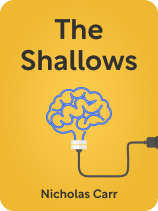

This article is an excerpt from the Shortform book guide to "The Shallows" by Nicholas Carr. Shortform has the world's best summaries and analyses of books you should be reading.
Like this article? Sign up for a free trial here.
Is the internet affecting your ability to remember information? How does online reading impact your memory retention?
Nicholas Carr explores the relationship between the internet and memory in his book The Shallows, explaining how the rapid pace of online content consumption can overload our mental processes. He argues that skimming text online reduces our engagement and ability to retain information.
Read more to get the details of how the internet impacts our memory.
The Internet and Memory
Skimming text by default comes with a price. Using the internet as our primary source of information doesn’t just reduce our level of engagement, it also reduces how much of it we can retain. Carr draws a straight line between the internet and memory, explaining that the pace at which you consume information has a direct impact on how much you remember. When you read slowly, such as with a physical book, your brain has ample time to transfer information into your long-term memory. However, the internet overloads that mental process. Given the rapid pace at which the internet drives you to skim online content, your brain struggles to transfer all that data from short-term memory into long-term storage.
(Shortform note: Carr divides memory into short-term and long-term, but there are actually several types of memory that store different types of information. Carr’s argument largely relates to semantic memory of facts and information. We also have episodic memory of events and experiences and implicit memory, such as knowing how to perform tasks or how to respond to something in the present based on prior experience. These implicit memories don’t require conscious effort to store or retrieve information. In Shortform’s The Master Guides: Supercharge Your Memory, we highlight several approaches to strengthening your retention skills, but all of these require practice to apply in a distraction-filled online environment.)
The cognitive overload you feel online also hampers your ability to discern what information is worth remembering. Carr says that this issue is compounded by the constant distractions and decision-making demands that internet use entails. For instance, deciding whether to click on links embedded in text increases how much work your brain has to do. This added mental burden leads to overall loss of retention, and research backs this up. Readers who encounter hyperlinked texts, such as those included in this article, have a harder time remembering content compared to those who read the exact same text without the links. Whether you click on a link is immaterial—what matters is the choice the link forces on you.
(Shortform note: The effects of hyperlinks on reading comprehension may be more nuanced than Carr suggests. Some research shows that people tend to re-read sentences containing hyperlinked uncommon words, suggesting that links are useful to highlight important information and they encourage re-reading for better comprehension. This can be attributed to the Von Restorff effect, in which standout items are more likely to be remembered. However, over-signaling important information, such as by using excessive links in text, reduces how effective the messaging is and dilutes the impact of information cues.)
Beyond the internet’s onslaught of hyperlinks, we’re constantly bombarded by multimedia stimuli while online—advertisements, videos, pop-ups, and the like. Carr argues that instead of enhancing your retention (as many educators at one time thought they would), these audiovisual add-ons often interrupt your train of thought, significantly reducing your ability to focus on and comprehend what you’re reading. While it’s true that some multimedia content can boost learning when properly applied, such as relevant diagrams or video demonstrations, most often they do more harm than good. After all, on the internet, Carr says, multimedia’s primary design purpose is distraction rather than enhanced learning.
(Shortform note: Carr isn’t out of line to suggest that multimedia tools are designed to distract us. In Make Time, online product designers Jake Knapp and John Zeratsky admit to having been part of the Big Tech competition to grab clicks, likes, and views. They write that today’s information industry has fine-tuned its tactics to keep you checking your apps and consuming new media—and that unlike industries with slower turnaround, tech developers can determine in real time how successful their strategies are. The barrage of media is so overwhelming that you have to actively put barriers in place to keep the internet from derailing your attention.)
Exercise
When you really want to remember something you read about, what do you do to help commit it to memory? Do you feel like the internet’s bells and whistles are a distraction, or do they not bother you at all?

———End of Preview———
Like what you just read? Read the rest of the world's best book summary and analysis of Nicholas Carr's "The Shallows" at Shortform.
Here's what you'll find in our full The Shallows summary:
- The ways internet use is literally reconfiguring our brains
- How information technologies reshape human behavior
- The sweeping societal consequences of these changes in human cognition






